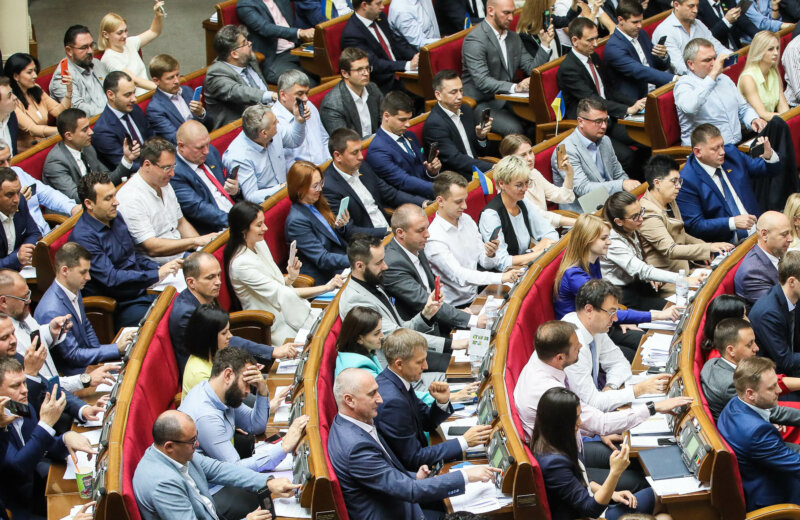Lifting lawmakers’ immunity from prosecution was one of the new Ukrainian parliament’s first achievements. In early September, the legislature, led by President Volodymyr Zelensky’s majority, passed the constitutional amendment that had been promised to Ukrainians for two decades with a sweeping 373 votes.
But the triumph didn’t last long.
On Dec. 18, that same parliament adopted a law that experts and critics believe will effectively make it harder to prosecute lawmakers.
The law received 291 votes, largely from Zelensky’s 248-member Servant of the People faction, the 44-member Opposition Platform – For Life faction and independent lawmakers. The 20-member Voice faction voted against the bill, while the 24-member Batkivshchyna and 27-member European Solidarity factions abstained from the vote. The president must now sign or veto the bill.
According to the bill, only the prosecutor general can launch criminal proceedings against a lawmaker. Previously, any investigator or prosecutor could do that.
In Ukraine, the prosecutor general is a political figure often controlled by the president.
“It means that if the prosecutor general doesn’t want to open the investigation or doesn’t see grounds for it, no one else will be able to do it,” explained Olena Shcherban, a lawyer with the Kyiv-based Anti-Corruption Action Center.
This rule could seriously hamper an ongoing investigation if the involvement of a lawmaker is discovered while the investigation is underway, she said.
The National Anti-Corruption Bureau (NABU) and the Special Anti-Corruption Prosecutor’s Office called upon Zelensky to veto the law.
“This bill will decrease the effectiveness of investigations that involve sitting lawmakers,” says their joint statement. “Some of its norms will cause problems in the early stages of the investigations, and allow lawmakers to evade responsibility.”
According to the bill, any pre-trial requests for arrests, searches or phone call logs, correspondence, and other documents will have to be authorized by the prosecutor general.
Moreover, these pre-trial requests will need to be reviewed by an investigating judge in the presence of the lawmaker in question.
“If an investigator wants to receive access to a lawmaker’s bank accounts, he or she won’t get it until that lawmaker shows up in court where this request is reviewed,” said Shcherban. “Lawmakers will be informed about investigative requests in advance by a judge. They can go to a bank and transfer money, or they can drag out the process.”
A lawmaker only can be arrested without a judge’s order if they are caught red-handed while committing a violent crime or killing a person.
In addition, under the bill, pre-trial investigations into lawmakers cannot be delegated to law enforcement agencies other than NABU and the central body of the State Investigation Bureau.
In October, the parliament voted to allow NABU and the State Investigation Bureau to wiretap lawmakers. Previously, NABU could do that only through the SBU security agency. However, NABU cannot wiretap or search lawmakers without parliament’s approval. Lawmakers can still cancel notices of suspicion through courts.



